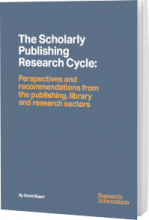Insight and recommendations for the scholarly publishing community

A new report, commissioned by Research Information magazine and published on 4 December, gathers together opinions on and recommendations for potential improvements in the scholarly publishing research cycle.
The Scholarly Publishing Research Cycle: Perspectives and recommendations from the publishing, library and research sectors, by David Stuart of Stuart Information Research, on behalf of Research Information, combines the results of a quantitative survey of readers, with detailed interviews from leading players in each of the three stakeholder groups.
All respondents were asked what they felt were the biggest challenges in the scholarly publishing research cycle today, and how they felt those challenges could be overcome. More specifically, they were asked how each stakeholder group could help the others.
Among the 30 or so recommendations featured in the report, those for researchers include ‘take an interest in the scholarly publishing ecosystem’ and ‘work to disentangle publication from promotion and tenure’. Publishers are encouraged to ‘be transparent about costs’ and ‘demonstrate the added value of publishers’, while librarians are encouraged to ‘educate library users about the whole of the scholarly publishing process’ and ‘provide users with information to help them make better publishing decisions’.
Among the researchers providing detailed interview responses is Professor Martin Eve, professor of literature, technology and publishing at Birkbeck, University of London, who recommends greater engagement from the research community. ‘I do wish that researchers would take more interest in the conditions of knowledge production and dissemination in the academy,’ he says. ‘Most researchers I know never really even read or query the contracts they are given by publishers.’
Other researchers interviewed include: Professor Stephen Curry, professor of structural biology at Imperial College London; Dr Corina Logan, Leverhulme Early Career Research Fellow, University of Cambridge, and co-lead on the Bullied into Bad Science campaign; and Professor Charles Oppenheim, former head of department of information science at Loughborough University.
Offering views from a librarian’s perspective is Dr Danny Kingsley, deputy director for scholarly communication and research services at Cambridge University Library, who says: ‘Libraries can’t necessarily do a great deal on their own, because everything is dependent; it is an ecosystem. The likelihood of all of us shifting together at the same time is probably fairly remote, so if it’s going to change at all it’s going to need an enormous disruptor.’
Further detailed librarian views are provided by: Professor Lisa Janicke Hinchliffe, professor/coordinator for information literacy service and instruction, University Library, University of Illinois at Urbana-Champaign; Simon Bains, head of research services and deputy librarian, University of Manchester Library; and Elaine L Westbrooks, vice provost of university libraries and university librarian, University of North Carolina at Chapel Hill.
Clare Hooper, head of journals at Liverpool University Press, is among those providing a perspective from publishers. ‘There’s a need to respond to ever-changing open access policies and regulations,’ she says. ‘This has meant that publishers need to find ways to make more research available free to access online, but still cover costs.’
Other representatives from publishers being interviewed include: Jean Roberts, business development director, UK/Europe, Glasstree Academic Publishing; Gemma Hersh, vice president open science, Elsevier; and Sara Uhac, managing director, InTec.
The full report – including detailed interviews, survey analysis and positive recommendations – is available to purchase now .
Researchers and librarians with a valid academic email address can view on online version of the report here. You must be logged in to Research Information in order to view.






